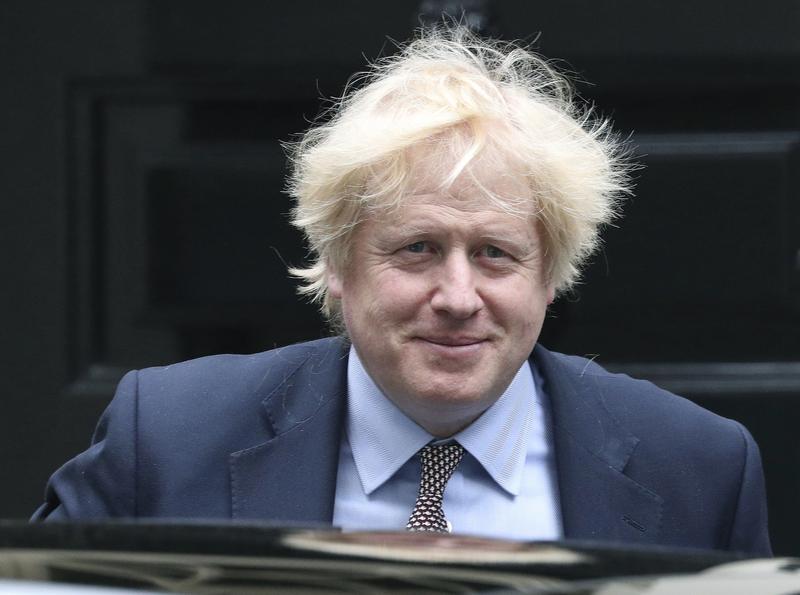 Britain's Prime Minister Boris Johnson leaves 10 Downing Street for PMQs in the House of Commons, London, June 3, 2020. (JONATHAN BRADY / PA VIA AP)
Britain's Prime Minister Boris Johnson leaves 10 Downing Street for PMQs in the House of Commons, London, June 3, 2020. (JONATHAN BRADY / PA VIA AP)
British Prime Minister Boris Johnson struck a mixed tone toward China on Wednesday as he called himself a Sinophile while claiming that he sees "no contradiction" with his latest ideas and comments regarding Hong Kong and Chinese telecommunications giant Huawei.
The British leader threated to enact national security legislation for the Hong Kong Special Administrative Region by offering Hong Kong residents a path to UK citizenship
At a daily news conference on Wednesday, Johnson said: "I am a Sinophile. I believe, I think China is an incredible country and an extraordinary civilization and I deeply disapprove of anti-Chinese xenophobia attacks on people of Chinese appearance that we've seen in recent months."
He made the remarks after a reporter asked about his plan to remove Huawei from the United Kingdom's 5G network entirely from 2023.
Prior to his "Sinophile" remarks, he once said:"I think that's the right thing to do on high-risk vendors in our critical national infrastructure. Well, you know my views, I think we've got to make sure that we have solutions for the UK that protect UK security and that's what this government is going to achieve."
Earlier on Wednesday, the British leader published signed articles in The Times newspaper and the South China Morning Post threatening to retaliate against the recent decision by China's top legislature, the National People's Congress, to enact national security legislation for the Hong Kong Special Administrative Region by offering Hong Kong residents a path to UK citizenship.
ALSO READ: Envoy: China, UK to fight epidemic with stronger trust
At the news conference, he was asked about the article and the possibility of returning to "business as normal with China".
Johnson said: "I see absolutely no contradiction with what I've said earlier about Hong Kong and high-risk vendors in critical national infrastructure and wanting a good, friendly, clear-eyed working relationship with China and that's what this country will have."
Interference 'will backfire'
Beijing had warned the UK that its interference in Hong Kong's affairs will "definitely backfire" in the wake of comments made by British Foreign Secretary Dominic Raab over the national security legislation.
In the Parliament on Tuesday, Raab said the UK vows to build an international alliance of democracies going beyond "the usual suspects" to force China to step back from the brink over its plans.
Chinese Foreign Ministry Spokesman Zhao Lijian said on Thursday that a healthy and stable China-UK relationship serves the common interests of both sides.
"But it requires the UK to work in the same direction with China and respect each other's sovereignty and territorial integrity, and refrain from interfering in each other's internal affairs," he said.
On Tuesday, China's embassy in the UK strongly protested a recent joint letter regarding the situation in Hong Kong that was signed by seven former UK foreign secretaries.
In the letter, those seven who held the top diplomatic post expressed their "concerns" about the recent decision by China's top legislature on establishing and improving the legal system and enforcement mechanisms for Hong Kong to safeguard national security.
They urged Johnson to raise this issue at the upcoming G7 meeting, and demanded that an International Contact Group set up to monitor the situation in Hong Kong.
READ MORE: Boris Johnson praises China's ivory trade ban
An unnamed Chinese embassy spokesperson said on Tuesday: "China expresses grave concern about and strong opposition to such flagrant interference in Hong Kong affairs, which are China's internal affairs."
In response to the issue of British National Overseas, or BNO, passports, the spokesperson said the UK had clearly pledged in a memorandum of understanding exchanged with China that BNO passport holders who are Chinese citizens residing in Hong Kong shall not have the right of abode in the UK.
"If the UK is bent on changing this unilaterally, it will not only go against its own position and promise but also violate international law and the basic norms governing international relations," the spokesperson added.


